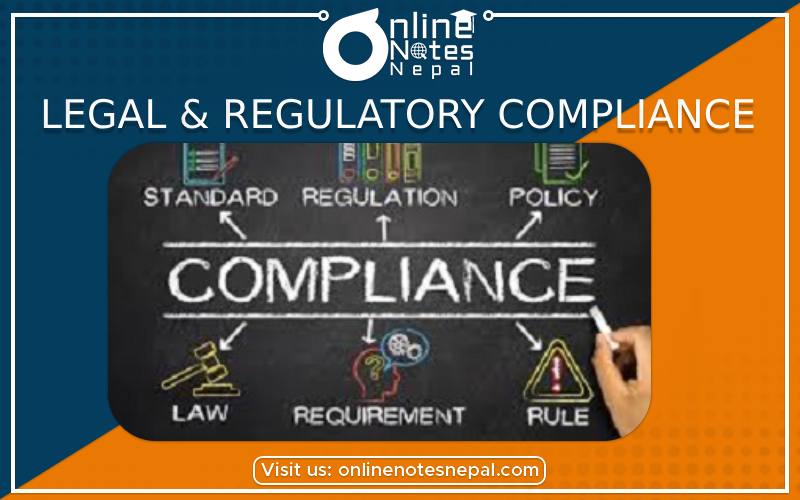Published by: Anu Poudeli
Published date: 17 Jul 2023

Legal and regulatory compliance is an essential component of any business or organization. It is the process of ensuring that your operations, policies, and practices are in accordance with applicable laws, regulations, and industry standards. Failure to comply with these standards can result in substantial legal implications, financial penalties, reputational damage, and, in certain situations, criminal accusations.
Here are a few significant themes and pieces of content about legal and regulatory compliance:
1.Compliance is essential:
Understanding the importance of compliance for businesses and organizations.
The advantages of keeping a solid compliance program.
2.Regulation Types:
Various types of rules (for example, data protection, labor laws, and environmental restrictions).
Regulations tailored to specific industries (for example, healthcare, banking, and technology).
3.Important Regulatory Frameworks:
GDPR (General Data Protection Regulation), HIPAA (Health Insurance Portability and Accountability Act), CCPA (California Consumer Privacy Act), SOX (Sarbanes-Oxley Act), and other significant rules are discussed.
4.Putting Together a Compliance Program:
Steps for developing an effective compliance program that is adapted to the needs of the organization.
Compliance officers and compliance committees play important roles.
5.Risk Evaluation and Management:
Risk assessments are carried out to detect compliance gaps and potential areas of risk.
Methods for reducing compliance risks.
6.Employee Education and Awareness:
The significance of educating staff about compliance policies and procedures.
Creating a compliance culture throughout the organization.
7.Monitoring and reporting on compliance:
Creating reporting systems for compliance infractions and concerns.
Monitoring compliance operations on a regular basis to guarantee that requirements are being followed.
8.Data Privacy and Security:
The importance of protecting personal and sensitive data.
Understanding data privacy regulations and response plans to data breaches.
9.Bribery and anti-corruption measures:
Understanding the rules and regulations governing anti-corruption.
Putting rules in place to avoid bribery and corruption.
10.Compliance with the Environment:
Environmental standards and sustainability programs must be followed.
The environmental and social consequences of noncompliance.
11.International Conformity:
Managing compliance issues when operating across borders.
Navigating varied legal and regulatory landscapes in different nations.
12.Penalties & Punishment:
Understanding the ramifications of noncompliance, including as penalties, sanctions, and legal action.
Learning from previous incidents of compliance-related enforcement.
13.Corporate Social Responsibility (CSR) and Ethics:
Integrating ethical values and corporate social responsibility programs with compliance tactics.
Compliance's function in promoting ethical behavior within the organization.
14.In the Digital Age, Compliance:
Addressing compliance issues in the context of developing technology (for example, AI and blockchain).
The consequences of digital transformation on compliance practices
15.Best Practices and Case Studies:
Examples of successful compliance programs in the real world.
Compliance failures provide us valuable lessons on how to avoid them.
Remember that legal and regulatory compliance is a continuous process that necessitates constant monitoring and adapting to changes in laws and industry standards. To maintain a compliant and sustainable operation, it is critical to communicate with legal specialists and stay up to date on the newest regulatory developments.